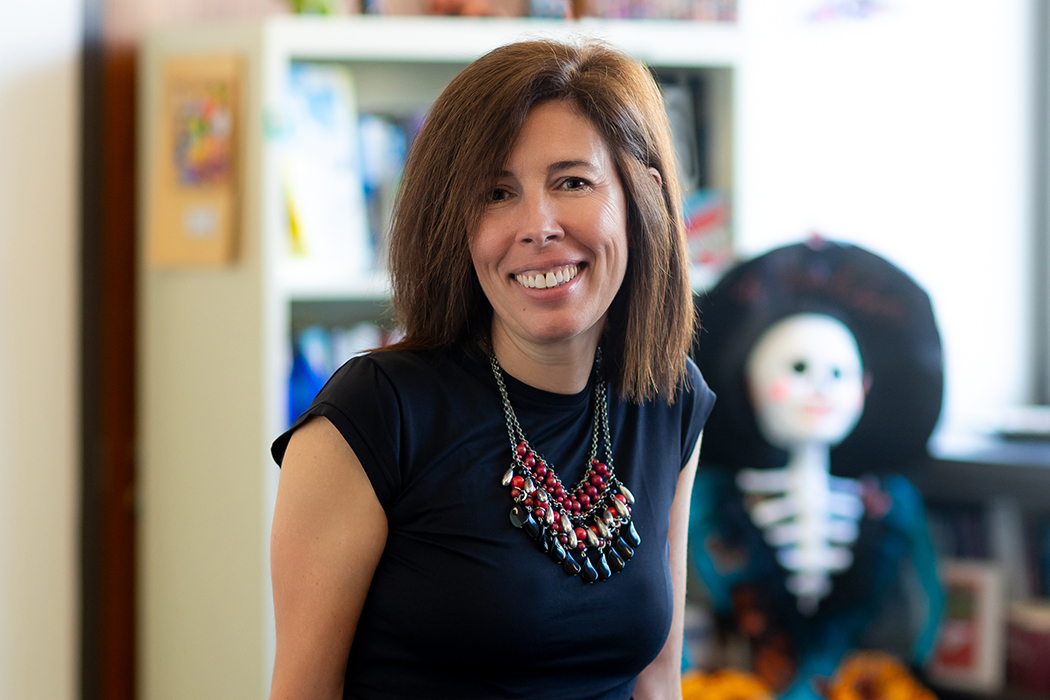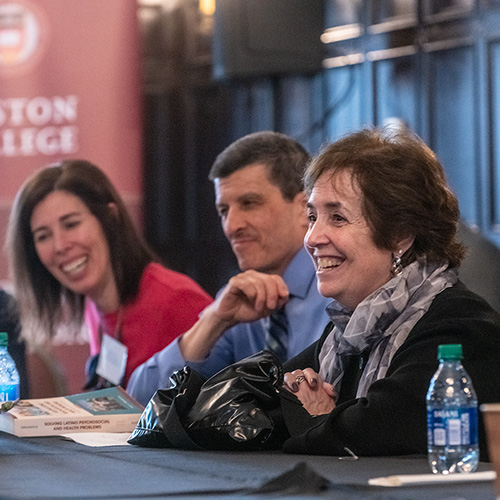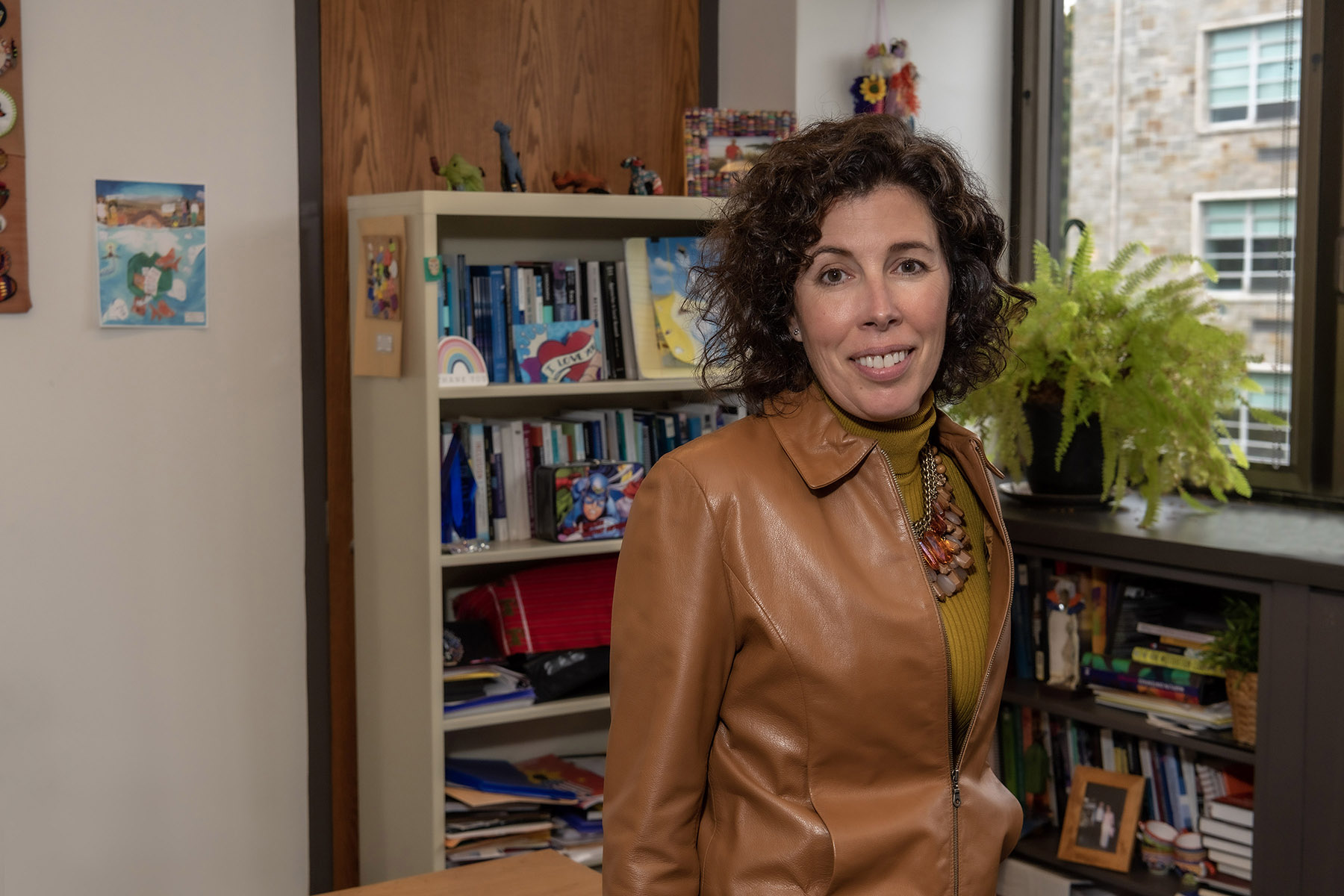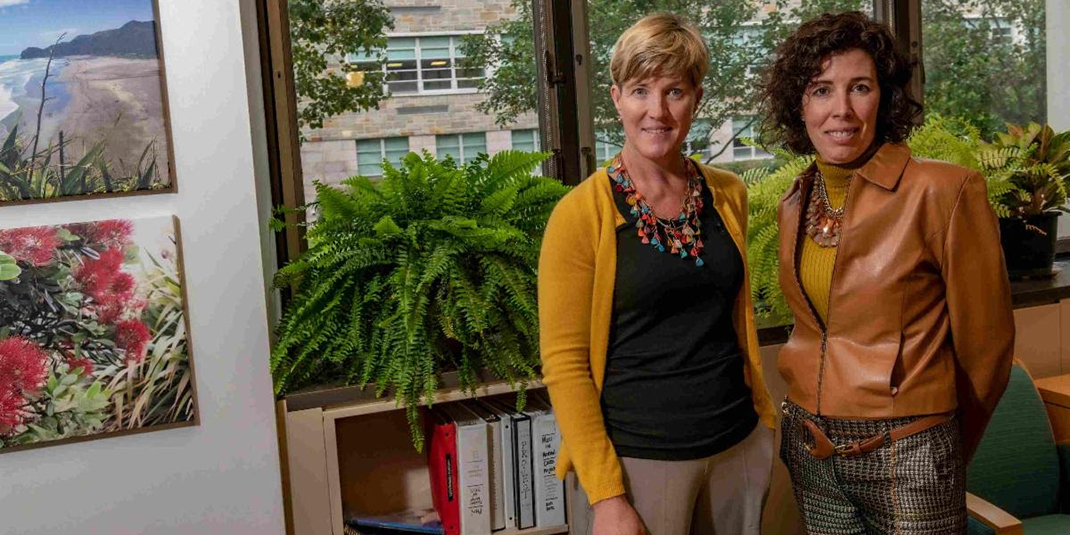
Rocío Calvo. Photo by Caitlin Cunningham for BC Photography.
Rocío Calvo, professor and founding director of the Latinx Leadership Initiative at the Boston College School of Social Work, has been elected vice president of the Society for Social Work and Research, a national organization committed to advancing research that improves the health and well-being of individuals, families, and communities.
“I am profoundly grateful for the opportunity to serve as SSWR’s next vice president,” said Calvo, who officially joined the organization’s Board of Directors for a two-year stint on February 1. “I am deeply committed to the organization’s mission of advancing research that addresses real-world practice and policy challenges to improve the well-being of society.”
Calvo has dedicated her career to understanding and addressing complex social issues confronting Latinx communities. Her work is deeply rooted in social work principles, with a particular focus on collaborating with and empowering communities to create policies and programs that promote systemic change.
Calvo’s research centers on understanding how to improve access to social services for Latinx populations, with an emphasis on working with communities to improve their health and well-being.
Her scholarship, like BCSSW’s mission to partner with individuals, families, and communities to solve intractable social problems, aligns with SSWR’s new strategic plan to address complex social issues.
In her application for vice president of SSWR, Calvo laid out a three-pronged approach to bolstering the organization’s long-standing commitment to collaboration, capacity building, and evidence-based research. Over the next two years, she hopes to:
Strengthen the capacity of members to co-design research projects by creating opportunities for professional development at all career levels. To accomplish this goal, Calvo said that she plans to develop workshops, seminars, and mentorship opportunities focused on research projects, grant writing, and policy advising.
Establish protocols for creating policy briefs and reports that translate research findings into actionable recommendations. At the same time, Calvo plans to establish advisory panels comprising social work researchers to increase public engagement through media outreach and community forums, raising awareness of evidence-based practices to address pressing social issues.
Form research teams that reflect a variety of perspectives and create spaces for open dialogue that considers research methods that have been adapted for use in different contexts and with different populations. Calvo also hopes to establish partnerships with international researchers and institutions to address social issues from broader points of view.
SSWR President Ramona Denby-Brinson said she is looking forward to collaborating with Calvo to improve social work research.
“I am very pleased to welcome you to the Board. We work hard and have fun striving to improve social work research,” Denby-Brinson told Calvo in an email announcing her election as vice president. “You will make an important contribution to SSWR and the profession, and I’m glad you will be with us.”
Calvo has been involved with SSWR for more than two decades, beginning when she served as doctoral student volunteer. Over the ensuing years, she’s helped create the Latinx-Focused Research Cluster, which she later chaired; reviewed research submissions for the organization’s annual conference; and facilitated the conference’s Latinx-Focused Special Interest Group.
As vice president of SSWR, Calvo and her fellow Board members—which include BCSSW Professor Karen Bullock—will meet on Zoom every month and gather in-person in Chicago this spring.
Calvo’s election as vice president of SSWR exemplifies her stature in the social work field, where she has been regularly recognized for her innovative interventions and contributions to the profession.
“I am profoundly grateful for the opportunity to serve as SSWR’s next vice president. I am deeply committed to the organization’s mission of advancing research that addresses real-world practice and policy challenges to improve the well-being of society.”
Her signature achievement is creating the LLI, a cohort-based program that prepares bilingual and bicultural social workers to accompany Latinx communities in developing sustainable solutions to complex problems in health, education, housing, and other areas.
Since Calvo founded the program in 2013, students have taken culturally and linguistically attuned courses in Spanish, completed internships in settings such as schools, hospitals, and shelters, and conducted cutting-edge research that has shaped social workers’ strategies to support Latinx clients.
Under her leadership, the LLI’s approach to educating Latinx students has drawn the attention of national organizations and top social workers across the country. The Center for Diversity at the Council on Social Work Education, the sole accrediting body for social work programs in the U.S., named the LLI a Model Program for Diversity Education. Excelencia in Education, an advocacy group, recognized the LLI with a top award for accelerating the educational success of Latinx students in a graduate program. And in celebration of its 10-year anniversary, the LLI held a daylong symposium convening nearly two dozen experts in social work, education, and policy to discuss the program’s strengths, challenges, and potential future paths.
Calvo’s research has received funding from the National Institutes of Health, the Massachusetts Department of Mental Health, top research hospitals such as Mass General Brigham and Boston Children’s Hospital, and institutions such as the Russell Sage Foundation.
Supported by a five-year, $2.8 million grant from the NIH, Calvo and her colleagues are currently testing a culturally and linguistically appropriate intervention for reducing vaccine hesitancy among Latinx patients at the East Boston Neighborhood Health Center and the South End Community Health Center.
The intervention, called MI VACUNA, involves motivational interviewing, in which clinicians use discrete, accommodating language to discuss patients’ vaccination status, views, and concerns.
If a patient is interested in receiving a vaccine, a behavioral health clinician initiates a warm handoff to a nurse for vaccination or schedules a follow-up appointment.
So far, patients who have participated in the intervention in year one of the study have reported lower vaccine hesitancy compared to patients who have received their usual care.
Calvo has also received several personal awards and special appointments.
In October 2019, she received CSWE’s Distinguished Recent Contributions to Social Work Education Award. The award recognized Calvo as “a leading scholar in the field of immigration and social welfare whose work on the role of social services on the integration of immigrants has become a model of positive disruption in the field.”
In November 2022, Calvo was appointed to the Massachusetts Behavioral Health Advisory Commission by outgoing Gov. Charlie Baker. In this role, Calvo and her fellow commissioners worked to address barriers to the delivery of equitable, culturally competent, and clinically-appropriate behavioral healthcare.
And in January 2023, Calvo received the Elizabeth Hurlock Beckman Award, which recognizes educators who have inspired their former students to achieve greatness. While Calvo is among more than 130 educators who have received the award since its inception in 2010, she is one of only a few social work professors who have been honored for inspiring their former students to make a significant contribution to society.
Now, Calvo is hoping to make a significant contribution to SSWR. “Over the next two years, I’m looking forward to deepening my commitment to collaborating with colleagues and communities to further research that improves people’s lives,” she said.





